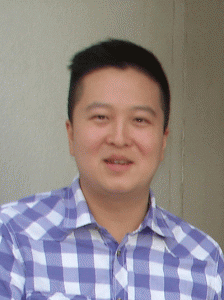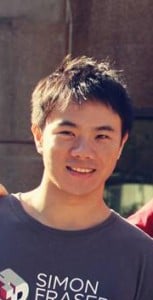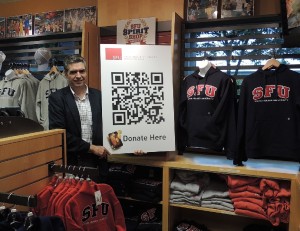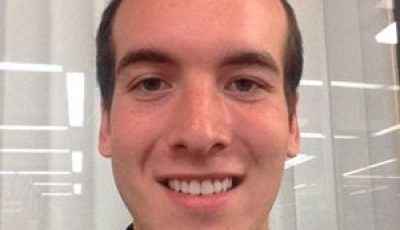Simon Fraser University embraces Bitcoin: SFU BTC Club president Mike Yeung, co-founder Jeff Chen talk on role in SFU’s decision
In late August, British Columbia-based Simon Fraser University (SFU) announced it had become the first Canadian higher-education institution to accept donations in Bitcoin.
SFU’s first Bitcoin donors were alumnus Scott Nelson, who is the chief technology officer of crowdfunding platform dana.io, and third-year business student Mike Yeung, who is president of the Simon Fraser Bitcoin Club. The pair donated the cash equivalent of $6,000 CAD.
The donation is supporting SFU students Laurie Macpherson and Lauren Shandley, who are using the contribution for their humanitarian co-op project. The students are going to Kolkata, India, where they will spend the fall semester working for Destiny Reflection, a social enterprise that empowers girls who are victims of, or are vulnerable to, human trafficking. The students were also each given one Bitcoin, worth $500 CAD at the time, to spend and foster dialogue about Bitcoin through their work.
The announcement followed the launch of SFU’s 50th anniversary campaign – “The Power of Engagement” – which aims to raise $250 million for programs that will engage students, increase research capacity, and contribute to the social, economic, environmental and cultural well-being of the university’s communities.
CoinReport spoke with Yeung and fellow third-year business student Jeff Chen, who is the Bitcoin Club’s co-founder and VP of Internal Operations, about their group and their role in SFU’s decision to accept Bitcoin donations.
Yeung said the development of the Bitcoin Club started as early as summer 2011, not long after he learned about the digital currency from dana.io’s Scott Nelson.
He said:
“For someone without a programming, business, or economics background, learning enough about Bitcoin to point where I can get the big picture took a lot of time and effort. But once I began mining and studying various subjects surrounding Bitcoin, the epiphany of just how revolutionary this thing really is hit me. And I wanted nothing more than to go out there and really preach to (the) world about it. One thing I thought I could do was to engage the leaders of tomorrow through establishing a club or a discussion group at my university, so that people can at least begin to learn about Bitcoin if they are so inclined.”
However, as Yeung began his studies that fall and became busy with schoolwork, Bitcoin had not been top-of-mind. When public interest in Bitcoin began to reach new heights along with its price in early 2013, that’s when Yeung’s “passion for Bitcoin and for spreading the gospel was renewed.” At that time, Yeung was surprised that no one had founded a Bitcoin group at SFU, so he made the choice to be committed this time and started contacting university friends and begin the process of converting them into Bitcoiners.
Over the summer of 2013, Yeung and his initial team members worked tirelessly to establish the right brand, network with the local Bitcoin community and school organizations, and plan events. By the time the Bitcoin Club launched last fall, Yeung said, its passion and commitment level started to inspire people, turning many skeptics, including SFU administrators, into Bitcoiners.
Yeung acknowledged to CoinReport that one of the key reasons he founded the club is because of SFU being a commuter institution, which allows for disconnection where people are not feeling engaged or making friends, and not having positive school spirit. Yeung’s hope was to connect people and foster a more interconnected and positive community.
Bitcoin’s “wiring” factor is what Jeff Chen finds most attractive about the digital currency. “The ability to remit money to anyone instantaneously, with less complications and restrictions than other types of payment services opens up massive doors for a world that is becoming more interconnected day by day,” said Chen. “The fee-free nature of Bitcoin allows us to transfer, donate, lend, and support causes that I want, anytime I want, anywhere I want, in any amount I want. Altogether, such features allows for new industries, especially for developing nations, that wouldn’t have been possible before.”
For Yeung, “the most exciting thing about Bitcoin is how it leads us to look at money and wealth in a completely new light. And the newfound curiosity that Bitcoin inspires is what helps to challenge the status quo. The other thing that equally excites me about Bitcoin is how it connects people from all corners of the globe and from every sector of society. I feel that this social aspect of Bitcoin is somewhat underappreciated, and perhaps the most important.”
Formally recognized by SFU’s student union in June 2013, the Bitcoin Club has been involved in more than 15 educational events in the past year. These included seminars featuring Bitcoin entrepreneurs and enthusiasts; several workshops to help people create and use Bitcoin wallets, understand mining concepts, and learn more about cryptocurrency training; and SFU’s first official Bitcoin event, which took place in July. Titled “Bitcoin: Cryptocurrency and Beyond,” the event featured David Andolfatto, VP of Research at the Federal Reserve Bank of St. Louis and an economics professor at SFU. Yeung said this event was well attended and was the first official collaboration between the Bitcoin Club and various units within SFU.
Chen told CoinReport that over the past nine months, the Bitcoin Club has been consulting and collaborating with the university to figure out how to best implement Bitcoin at the institution to satisfy the overachieving goal of making the university a leader in innovation and engagement. (In February 2012, SFU released a new strategic vision, which stated that the institution would aim “to be the leading engaged university defined by its dynamic integration of innovative education, cutting-edge research, and far-reaching community engagement.”)
Chen added that “so far, we’ve successfully lead SFU to become (what we believe to be) the world’s first university to accept Bitcoin donations.”
Yeung said the Bitcoin Club’s role was to consult and convince SFU’s advancement department that getting on board with the virtual currency would have a positive impact on the university, its students, and Bitcoin itself.
Yeung said:
“Our firm also played a role in helping SFU Advancement market and spread word of its Bitcoin donation acceptance so that the public understands SFU is a leader in innovation, so its relationship with Bitcoin was a natural fit, and help set an anticipatory tone for greater adoption of Bitcoin at SFU.”
The firm Yeung refers to is Saftonhouse Consulting Group, of which he is CEO and Chen is chief financial officer. (Yeung said the firm is currently redesigning its website, which will go live as early as Sunday.)
“Being the boots on the ground here in Vancouver when it comes to pushing Bitcoin, we found there to be a sizable demand for professional consulting service for Bitcoin,” said Yeung. “Many businesses and what not are seeking practical advice as to why they should care about Bitcoin, and once they get it, they want to be able to seamlessly integrate and be able to market their integration. We also found that for Bitcoin to become more legitimate and accessible by the mainstream, it would be integral to connect those who could help the cause and make it a reality with those who are already in the community. Finally, creating our firm was a great way for the devoted executives of our Club to be even more involved in the Bitcoin industry and learn even more valuable lessons about personal growth and entrepreneurship. I think overall, by having done work through Saftonhouse, the level of professionalism in this scene raises. And that helps immensely when interacting with those who are curious about Bitcoin and may soon be looking for active integration.”
Chen said the firm advised SFU Advancement on which Bitcoin payment processor would be best suited for the unit, believing BitPay is a good fit. The firm also advised the unit to allow it to donate Bitcoins into the hands of student recipients Laurie Macpherson and Lauren Shandley, rather than cashing them out first.
Yeung added that SFU Advancement accepted the proposition not to cash out all the Bitcoins, and legitimized the process by giving them tax receipts for the donated Bitcoins that were not converted. The firm also work with SFU’s public affairs department “to weave the narrative so that the media understands that this is not just about Bitcoin. Rather, it’s about supporting an innovation that can benefit numerous impoverished people around the world, especially those in developing nations who are been marginalized by the dark side of globalization and neglected by forces beyond their influence. By ensuring that SFU Advancement moved forward with implementation in a steadfast manner, we’ve shown that Bitcoin is something good to get behind and that we often need to step outside of box in order to become more progressive.”
Chen said university administration has provided a lot of feedback since SFU announced the Bitcoin donation option, and individuals who were not part of this initiative were very happy with the amount of positive local and international attention the university has received. He said many students have approached the club to show their support and appreciation for making the Bitcoin donation option happen. Yeung added that the Bitcoin community was also very supportive, reflected in the receiving of more than 50 unique donations in the first few days following the Bitcoin donation announcement.
Chen says the Bitcoin Club is currently working with SFU’s bookstores across the university’s three campuses (in Burnaby, Vancouver, and Surrey) to integrate Bitcoin as a method of payment and to install three BTMs. The university’s dining services is also expected to integrate Bitcoin later this fall. And early next year, SFU, the Bitcoin Club, and Saftonhouse will host a Bitcoin conference in Vancouver aimed at connecting students, educators, entrepreneurs, professionals, and government officials.
“We hope that by successfully taking these steps, the school will achieve even higher levels of Bitcoin adoption and innovation in the coming year and beyond so that it can (be) considered a ‘Bitcoin Campus’,” said Chen.
One proponent of a Bitcoin ecosystem at SFU is Mark McLaughlin, the university’s executive director of Ancillary Services, whom Yeung said he sees eye-to-eye with on a lot of things.
In an interview with the Georgia Straight in August, McLaughlin confirmed that SFU is assessing the feasibility of accepting Bitcoin payments and installing BTMs in its bookstores, as well as experimenting with Bitcoin in some of the university’s dining services.
“It would be about creating somewhat of an ecosystem on our campus,” McLaughlin told the Straight. “It’s one thing to accept Bitcoin. If there were some ATMs around the campuses, at least it’d make it easier for students to obtain Bitcoin.”
“Digital currencies are definitely here to stay,” he added. “We recognize that. Other institutions maybe aren’t up to speed yet on digital currencies.”
McLaughlin provided CoinReport with a draft document from SFU about fostering innovation at the university through Bitcoin. The document states that “by introducing Bitcoin onto the campus at SFU, we are providing our students with such an experiential learning opportunity.”
“By moving to offer students and community to test the use of Bitcoin,” says the document. “We will better educate ourselves and be better prepared to be digital citizens of the world. By introducing this new technology to our campus, it is also hoped that we may ignite ideas and inspire some of our young student entrepreneurs.”
The document mentions the launch of the “SFU Bitcoin Project” as a one-year pilot study. After one year, and before continuing, the university will analyze project metrics to determine whether the expected benefits were realized and whether objectives were met.
The project is four-pronged:
- Accepting Bitcoins for retail transactions in dining venues and at the bookstores;
- Accepting Bitcoin donations to SFU;
- Enabling dialogue by hosting speakers and a conference; and
- Installing Bitcoin ATMs.
Under the pilot program, SFU has no plans to accept Bitcoin for tuition fee payment, despite the Bitcoin Club’s argument that the cost of transferring funds internationally using the virtual currency can be significantly less expensive to students compared to traditional means.
The document notes that allowing Bitcoin for the payment of goods and services is on par with SFU’s Ancillary Services’ business objectives, which including “being a leader in the Canadian University field, providing exceptional customer service, being responsive to and inspiring students, and seeking additional revenue generating opportunities. We are providing an experiential learning environment for students and inspiring them to engage the ‘unrecognizable future’ now.”
The document concludes that “by offering our students the opportunity to test the use of Bitcoin, we will better educate ourselves and be better prepared to be digital citizens of the world.”
In an email to CoinReport, McLaughlin said the university hopes its joint actions with the Bitcoin Club to create a Bitcoin ecosystem on campus will inspire the university’s entrepreneurial-oriented students to launch their own Bitcoin businesses.
Yeung told CoinReport that SFU is demonstrating its vision as an engaged university “in various ways through partnering with various organizations off-campus to provide our students with a well-rounded and practical education. It is also supportive of student initiatives, especially when it comes to technical innovations, social change, and sustainability.”
Yeung added:
“Given SFU’s founding mission to be a ‘radical campus,’ we think accepting bitcoins for donations was a perfect overlap between the Club’s mission and the school’s mission. All in all, this was a huge first step. It provided great motivation for both our Club and the school. If things continuing to move forward, then SFU could truly be considered the blank canvas for students to push their forward-thinking innovations onto. Being that blank canvas is something that we believe all universities should inspire to be.”
Images:
Soggybread (license) (for SFU’s aerial photo)
Mike Yeung
Jeff Chen
Mark McLaughlin





![[Guest Post] The True Use Cases for Bitcoin and Its Role in Banking the Unbanked](https://coinreport.net/wp-content/uploads/2019/04/Ray-Youssef-Paxful-CEO-400x230.jpg)











I am a member of the btcclub. I and my friends recently could not access our accounts. Can anyone help with any useful information?
Thanks